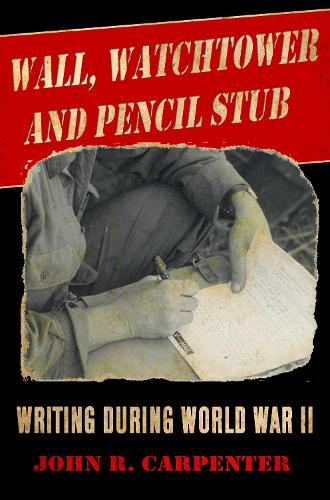
Wall, Watchtower, and Pencil Stub: Writing During World War II
(Hardback)
Publishing Details
Wall, Watchtower, and Pencil Stub: Writing During World War II
By (Author) John R. Carpenter
Skyhorse Publishing
Yucca Publishing
9th September 2014
United States
Classifications
General
Non Fiction
Literary studies: general
Second World War
Modern warfare
809.04
Physical Properties
Hardback
304
Width 152mm, Height 229mm, Spine 28mm
463g
Description
How World War II became central in our culture. Even as World War II raged on, contemporary writers were riveted by its every twist and turn. One of the war's most fascinating features was that it was subject to constant change, surprises, and fate reversal. It ensured that wartime writers, who did not yet know of its outcome, adopted points of view that were entirely spontaneous, rather than based on historical hindsight.
Reviews
World War II and its consequences will not leave our consciousness and sense of civilization; the question of the circumstances under which the best writers made their voices heard remains as urgent today as it ever was. John R. Carpenter is to be congratulated on his detailed and courageous refutation of the often heard saw that in wartime, the Muses are silent. His book belongs in all academic as well as public collections. Emery George, poet and editor of Contemporary East European Poetry
John Carpenters Wall, Watchtower, and Pencil Stub is the story of writing, and the urgency of communication, during World War II. This fascinating and engaging account discusses work from many nations and touches on a wide variety of examples, from sophisticated literature to scrawled notes thrown by prisoners from trains. The pages dealing with the wars role in fostering distrust of rhetoric, euphemism, and abstraction are especially timely in this era of marketing and political newspeak. Philip Fried, poet and editor of the Manhattan Review
"This books real strength is in what it suggests about our desire (and perhaps need) to bear witness to wars horrors."Booklist
World War II and its consequences will not leave our consciousness and sense of civilization; the question of the circumstances under which the best writers made their voices heard remains as urgent today as it ever was. John R. Carpenter is to be congratulated on his detailed and courageous refutation of the often heard saw that in wartime, the Muses are silent. His book belongs in all academic as well as public collections. Emery George, poet and editor of Contemporary East European Poetry
John Carpenters Wall, Watchtower, and Pencil Stub is the story of writing, and the urgency of communication, during World War II. This fascinating and engaging account discusses work from many nations and touches on a wide variety of examples, from sophisticated literature to scrawled notes thrown by prisoners from trains. The pages dealing with the wars role in fostering distrust of rhetoric, euphemism, and abstraction are especially timely in this era of marketing and political newspeak. Philip Fried, poet and editor of the Manhattan Review
"This books real strength is in what it suggests about our desire (and perhaps need) to bear witness to wars horrors."Booklist
Author Bio
John R. Carpenter is a writer, editor, and leading translator of books and poetry. A gifted talent, he has achieved the National Endowment for the Arts three times and won a series of awards honoring his translations. Carpenter lives in Ann Arbor, Michigan.
